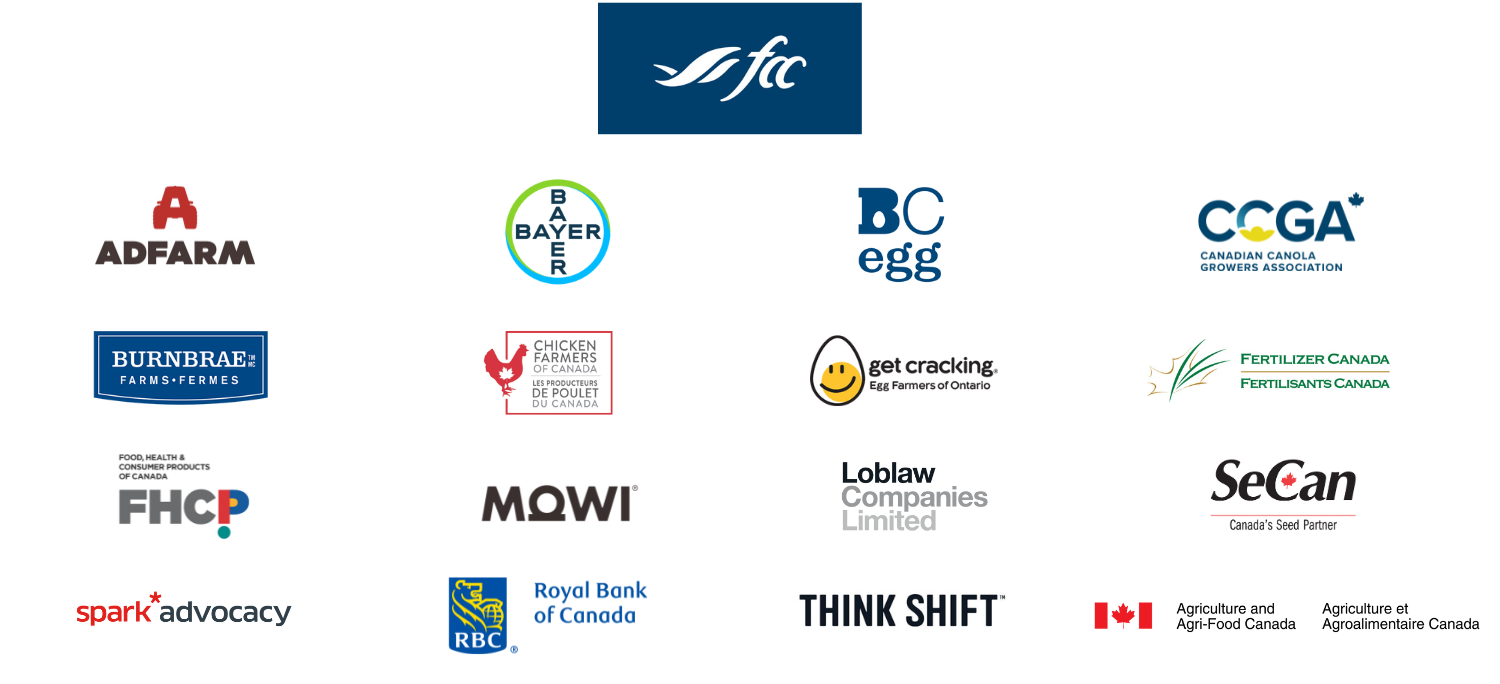Public Trust Summit

This year’s Public Trust Summit will explore one of the most urgent challenges facing Canada’s food system: the growing influence of misinformation on public trust. Recent research reveals that 91% of Canadians are concerned about food misinformation, yet the majority rarely verify the information they consume. This leaves the public vulnerable to misleading narratives—whether spread by socialmedia influencers, self-proclaimed experts, or organized disinformation campaigns aimed at eroding trust in food and farming.
With the theme Fear, Facts, and Food: The Fight for Trust, the 2025 Summit will explore the growing phenomenon of “fear-fluencing”—the spread of fear through misinformation and distortion—and unveil new strategies to engage consumers, strengthen trust, and safeguard the integrity of our food system.
About the Summit
Date and time: October 28, 2025 8:00 AM – October 29, 2025 1:00 PM ET
Location: The Westin Toronto Airport Hotel
Admission: $725 + fees
Agenda
DAY 1
8:00 am
Registration & Coffee
9:00 am
Welcome & Objectives of the Day
9:15 am
Opening Keynote | The Science of Misinformation: How Myths Take Root and How to Pull Them Out – Dr. Joe Schwarcz, Director, McGill Office for Science and Society
10:45 am
Nutrition Break
11:00 am
What Canadians Believe: 2025 Public Trust Research – Ashley Bruner, Director of Research and Stakeholder Engagement, CCFI
12:30 pm
Lunch
1:30 pm
Plenary Strategy Session (Part 1) | Disarming the Misinformation Machine: You Can’t Out-Fact Fear – Paul Hillier, Partner, TACTIX Risk Communications
2:30 pm
Nutrition Break
3:00 pm
Plenary Strategy Session (Part 2) | Continuing the Discussion
4:30 pm
Nadine Durant, Vice-President, Head of Food Ecosystem Awareness, FCC
4:45 pm
Wrap up Insights
6:00 pm
Reception: Food Stations and Hors D’Oeuvres
DAY 2
7:30 am
Breakfast
8:30 am
Objectives of the Day
8:45 am
Consumer Insight Session | When Misinformation Crosses Borders: Emotion, Identity, and Trust in the Food System – Dr. Mike von Massow, Professor, University of Guelph
10:00 am
Nutrition Break
10:30 am
Closing Keynote | System Shock: Misinformation, Disruption, and the Battle for Credibility – Jesse Hirsh, Futurist & Digital Strategist
11:45 am
Wrap up Insights
12:00 pm
CCFI Members Only Lunch and Information Session
Sessions
Opening Keynote | The Science of Misinformation: How Myths Take Root and How to Pull Them Out
Dr. Joe Schwarcz, Director, McGill Office for Science and Society
Fear-based food messaging is everywhere—from viral videos about seed oils to marketing campaigns that demonize ingredients without scientific basis. In this high-energy keynote, Dr. Joe Schwarcz will explore why food myths are so persistent, how misinformation spreads through emotion and repetition, and why simply stating the facts isn’t enough to change minds.
Drawing on decades of experience as one of Canada’s leading science communicators, Dr. Joe will unpack how trust is earned, how credibility is lost, and what it really takes to push back against confusion without becoming defensive or dismissive. Through real-world examples, a touch of humor, and a strong dose of science, this keynote will remind us that building trust isn’t just about evidence—it’s about connection, empathy, and storytelling.
This session sets the tone for the entire Summit and will leave participants energized, informed, and ready to tackle misinformation head-on.
Research Briefing | What Canadians Believe: 2025 Public Trust Research
Ashley Bruner, Director of Research and Stakeholder Engagement, CCFI
What do Canadians really believe about food, farming, and the people behind the system? This session presents the latest findings from CCFI’s national public trust research, one of the longest-running studies of its kind in Canada. Drawing on new data from thousands of Canadians, this briefing will highlight where trust is growing, where skepticism is taking hold, and which issues are shaping the national conversation.
From farming practices to food safety, sustainability to innovation, this research offers a clear picture of what matters most to Canadians today—and where the food system needs to pay closer attention. Whether you’re shaping policy, leading communications, or planning future outreach, these insights will help you engage with greater impact and relevance in the year ahead.
Plenary Strategy Session | Disarming the Misinformation Machine: You Can’t Out-Fact Fear
Paul Hillier, Partner, TACTIX Risk Communications
When misinformation takes hold, the consequences can be swift, public, and far-reaching. In the United States, the Make America Healthy Again (MAHA) movement has become a powerful driver of public concern around food and health. By calling out ingredients and products it claims are unsafe—often without strong scientific evidence—MAHA has created a wave of uncertainty among consumers. That uncertainty has already led some major brands and retailers to change formulations, rework messaging, or pull products from shelves altogether.
While the movement originated in the U.S., the narratives it promotes are starting to influence Canadian conversations. Food system leaders in Canada are already seeing signs that these messages are crossing the border and reshaping how consumers view safety, trust, and transparency.
In this high-level strategy session, Paul Hillier will explore how these emerging pressures create reputational risk for Canadian food organizations and what leaders can do now to prepare. Drawing on original research and interviews with sector stakeholders, the session will examine how misinformation affects not just public perception, but also internal dynamics and decision-making.
Participants will consider what organizational readiness really looks like when trust is tested. The discussion will surface common gaps, such as unclear roles, conflicting priorities, and slow internal alignment, that can undermine a response before it even begins. Rather than focusing on messaging tactics, the session will focus on how leaders can build the internal clarity and confidence needed to respond with credibility when fear moves faster than facts.
This is an essential session for anyone looking to protect trust in a shifting public landscape.
Consumer Insight Session | When Misinformation Crosses Borders: Emotion, Identity, and Trust in the Food System
Dr. Mike von Massow, Professor, University of Guelph
Narratives around food and health are increasingly shaped by emotion, not evidence—and many of them aren’t even homegrown. U.S.-based conversations about ingredients, processing, and “clean” eating are spilling into Canadian discourse, often without context or scientific grounding. From seed oil panic to demonization of processed foods, these stories are reshaping how Canadians think about food, risk, and the role of industry.
In this insight-driven session, Dr. Mike von Massow will explore how emotionally charged narratives gain traction, why fear often resonates more deeply than facts, and how public trust is shaped in the spaces between information and identity. Drawing on research in food economics, consumer behaviour, and public perception, he will unpack the deeper motivations behind consumer beliefs—and what this means for anyone communicating about food.
Participants will come away with a sharper understanding of how misinformation takes root, what drives skepticism, and what it takes to build trust in a landscape that rewards simplicity, emotion, and suspicion. This session is essential for anyone looking to connect with Canadians in a way that is credible, relevant, and lasting.
Closing Keynote | System Shock: Misinformation, Disruption, and the Battle for Credibility
Jesse Hirsh, Futurist & Digital Strategist
Traditional In an age of constant disruption, trust rules are being rewritten. Influencers, fragmented media, and algorithm-driven platforms are challenging institutions that once held authority. Credibility is no longer granted automatically—it is earned, negotiated, and sometimes undermined in real time.
In this provocative closing keynote, Jesse Hirsh explores how information architecture has changed, and what that means for sectors like food and agriculture. He’ll examine how new voices and digital gatekeepers shape public perception, why polarization and performative narratives thrive online, and how traditional organizations can adapt without losing their core identity.
This session will push participants to think beyond messaging and into the broader dynamics of legitimacy, power, and visibility. It will raise hard but necessary questions: Who gets to speak with authority today? What makes a message credible when everyone has a platform? And how can food system leaders remain trusted when trust itself is under strain?
Jesse will close the Summit by challenging us to see the trust challenge not just as a communications problem, but as a systems problem—and to consider what long-term credibility looks like in a world where attention is short, skepticism is high, and disruption is the new normal.
Speakers

Dr. Joe Schwarcz | Author, Professor and Director of the McGill Office for Science and Society
Dr. Joe, as he’s widely known, is the Director of McGill University’s Office for Science and Society and one of Canada’s most engaging and trusted science communicators. A longtime CJAD radio host, columnist for the Montreal Gazette, and author of more than 20 bestselling books—including Quack Quack, The Right Chemistry, and A Grain of Salt—he’s spent decades translating complex science into plain language while debunking fear-based messaging and pseudoscience.

Ashley Bruner | Director of Research & Stakeholder Engagement, CCFI
Ashley brings data to life, helping Canada’s food system connect with Canadians on the issues that matter most. With over a decade of research and policy experience, she specializes in translating public opinion into meaningful insights that inspire action.
Before joining CCFI, Ashley was a Senior Research Manager at Ipsos Public Affairs, where she led hundreds of projects for clients across the public, private, and non-profit sectors. She holds a Master of Public Policy from Simon Fraser University. For the past five years at CCFI, Ashley has been a driving force behind building public trust in food. Her sharp eye for detail and deep passion for the food system shine through in every insight she shares.

Paul Hillier | Partner, Tactix Risk Communications
Paul is a Partner at Tactix Risk Communications, leading the firm’s DeepLearning insights. He previously spent 10 years in the Canadian Forces, working on psychological operations and counter propaganda. Tactix’ food and agriculture practice has, for 25 years, worked to protect Canadian’s trust in innovative products, ingredients, and systems.

Dr. Mike von Massow | Professor, University of Guelph
Mike is interested in how people think about food, with recent work focusing on labeling, novel food products, animal welfare and antibiotic use. He is also active in the interdisciplinary Guelph Food Waste Research Project with Dr. Kate Parizeau. Mike’s research also considers the structure and performance of food value chains as they evolve in response to changing consumer preferences.
Mike joined FARE in 2016 after a period in the College of Business and Economics. He joined the University of Guelph in 2010 upon completing his PhD. He worked in operations and marketing roles in the agri-food industry before beginning his Doctoral studies in pricing strategy. He also worked as a management consultant and policy researcher. His industry experience informs both his teaching and research.
Mike speaks frequently about food waste, animal welfare and other research projects. He has written for the Globe and Mail and other publications and is often quoted in the media. As a frequent blogger with a strong presence on broadcast, print and social media, Mike contributes to the Department’s efforts to mobilize research that informs public policy and private strategy. He also introduced his FoodFocus Podcast to discuss issues in the food space. Mike is a member of the steering committee for the Campbell Centre for the Study of Animal Welfare.

Jesse Hirsh | Futurist & Digital Strategist
Jesse Hirsh is a futurist farmer who brings an outsider’s perspective and literal critical distance, operating from his farm in rural Eastern Ontario. Yet this is no ordinary farm. Wired up with high speed fiber optic Internet, the Academy of the Impossible engages in a wide range of research regarding agriculture, media, technology, and culture.
He has a Masters degree from Toronto Metropolitan University in algorithmic media, and his current work focuses on the rise of automated media, as well as the governance and ethics of artificial intelligence, data protection, and privacy.
Jesse is also a co-founder of the Eco Punks, a trans-disciplinary agency that analyzes the ecosystems and communities that our clients operate in, helping us identify opportunities resulting from, as well as responses to the ever changing challenges that are imposed on us by an increasingly unpredictable and unstable reality. Jesse has an infectious energy that lifts spirits and enables creative critical thinking. He’s always learning, sharing, and helping others to do the same.
Sponsorship Opportunities
Investing in the 2025 Public Trust Summit showcases your dedication to fostering trust within Canada’s food system. It offers a unique opportunity to connect with influential leaders elevating your visibility within the Canadian agriculture and agri-food sector.
As a sponsor of the Summit, you’ll have the opportunity to:
- Showcase your programs and products, reaching a targeted audience of industry professionals
- Network and connect with other industry leaders, building valuable partnerships
- Speak and engage with the audience, sharing your insights and expertise with delegates
- Inspire the audience with your corporate vision, demonstrating your leadership in the food sector
Thank You to Our Sponsors!
